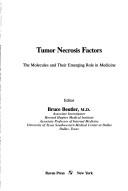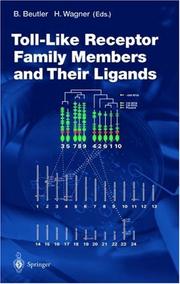| Listing 1 - 5 of 5 |
Sort by
|
Book
ISBN: 1281491659 9786611491659 354075203X 3540752021 3642094457 Year: 2008 Publisher: Berlin : Springer,
Abstract | Keywords | Export | Availability | Bookmark
 Loading...
Loading...Choose an application
- Reference Manager
- EndNote
- RefWorks (Direct export to RefWorks)
This monograph deals with the impact of classical genetics in immunology, providing examples of how large immunological questions were solved, and new fields opened to analysis through the study of phenotypes, either spontaneous or induced. As broad as biology has become, there are those who do not fully understand what the genetic approach is, and how it differs fundamentally from most of the methods available to natural scientists. They may hold the opinion that genetics has run its course since Mendel read his paper on peas in 1865. “Why bother with classical genetics,” they may ask. “Won’t all genes be knocked out soon anyway?” Or they are intimidated by genetics, with its heavy reliance on model organisms that seem so alien. “What has C. elegans to do with me?” the questioning might go. “It doesn’t even have lymphocytes. ” Such skeptics may be unaware that the mouse is fast becoming as tractable a model organism as the fly, and that humans may not be too far behind. So I would like to introduce the topic with a few words about the power of genetics, and why it has contributed so much to immunology, and to biology in general. Genetics, as the word is used here, is not merely the science of heredity, but much more than that. It is the science of exceptions: the science that takes note of heritable variation and seeks to explain it at the most fundamental level.
Immunogenetics. --- Genetics --- Immunity --- Immunology --- Serology --- Immunological aspects --- Genetic aspects --- Immunology. --- Immunobiology --- Life sciences

ISBN: 088167852X Year: 1992 Publisher: New York Raven Press
Abstract | Keywords | Export | Availability | Bookmark
 Loading...
Loading...Choose an application
- Reference Manager
- EndNote
- RefWorks (Direct export to RefWorks)
Digital
ISBN: 9783540752035 Year: 2008 Publisher: Berlin, Heidelberg Springer-Verlag Berlin Heidelberg
Abstract | Keywords | Export | Availability | Bookmark
 Loading...
Loading...Choose an application
- Reference Manager
- EndNote
- RefWorks (Direct export to RefWorks)

ISBN: 3540435603 9783540435600 Year: 2002 Volume: 270 Publisher: Berlin Springer
Abstract | Keywords | Export | Availability | Bookmark
 Loading...
Loading...Choose an application
- Reference Manager
- EndNote
- RefWorks (Direct export to RefWorks)
Natural immunity --- Immunogenetics. --- Ligands (Biochemistry) --- Nuclear receptors (Biochemistry) --- Immunité naturelle --- Immunité --- Ligands (Biochimie) --- Récepteurs nucléaires (Biochimie) --- Aspect génétique --- Interleukins --- Cellular immunity --- Cellular signal transduction --- Immunogenetics --- Immunity, Cellular --- Ligands --- Receptors, Cell Surface --- 577.27 --- 577.27 Molecular bases of immunity. Molecular immunology --- Molecular bases of immunity. Molecular immunology --- Cell Surface Hormone Receptors --- Endogenous Substances Receptors --- Cell Surface Receptor --- Cell Surface Receptors --- Hormone Receptors, Cell Surface --- Receptors, Endogenous Substances --- Receptor, Cell Surface --- Surface Receptor, Cell --- Binding Sites --- Hormones --- Receptor Cross-Talk --- Ligand --- Cellular Immune Response --- Cell-Mediated Immunity --- Cell Mediated Immunity --- Cell-Mediated Immunities --- Cellular Immune Responses --- Cellular Immunities --- Cellular Immunity --- Immune Response, Cellular --- Immune Responses, Cellular --- Immunities, Cell-Mediated --- Immunities, Cellular --- Immunity, Cell-Mediated --- Response, Cellular Immune --- Lymphokines --- T-Lymphocytes --- Interleukin-12 --- Genetics --- Immunity --- Immunology --- Serology --- Cellular information transduction --- Information transduction, Cellular --- Signal transduction, Cellular --- Bioenergetics --- Cellular control mechanisms --- Information theory in biology --- Cell-mediated immunity --- Cellular immunology --- Clonal selection theory --- Immune response --- Disease resistance --- Host resistance --- Innate immunity --- Innate resistance --- Native immunity --- Natural resistance --- Nonspecific immunity --- Resistance to disease --- Growth factors --- Lymphocytes --- Receptors --- Immunological aspects --- Genetic aspects --- Immunity, Natural - physiology --- Membrane Glycoproteins --- Models, Immunological --- Signal Transduction --- immunochemie --- immunochemistry --- immunologie --- immunology --- receptoren --- receptors --- heat shock eiwitten --- heat shock proteins --- liganden --- ligands --- Immunologie
Book
ISBN: 9783540752028 9783540752035 Year: 2008 Publisher: Berlin, Heidelberg Springer-Verlag Berlin Heidelberg
Abstract | Keywords | Export | Availability | Bookmark
 Loading...
Loading...Choose an application
- Reference Manager
- EndNote
- RefWorks (Direct export to RefWorks)
This monograph deals with the impact of classical genetics in immunology, prov- ing examples of how large immunological questions were solved, and new fields opened to analysis through the study of phenotypes, either spontaneous or induced. As broad as biology has become, there are those who do not fully understand what the genetic approach is, and how it differs fundamentally from most of the methods available to natural scientists. They may hold the opinion that genetics has run its course since Mendel read his paper on peas in 1865. Why bother with classical genetics, they may ask. Won't all genes be knocked out soon anyway? Or they are intimidated by genetics, with its heavy reliance on model organisms that seem so alien. What has C. elegans to do with me? the questioning might go. It doesn't even have lymphocytes. Such skeptics may be unaware that the mouse is fast becoming as tractable a model organism as the fly, and that humans may not be too far behind. So I would like to introduce the topic with a few words about the power of genetics, and why it has contributed so much to immunology, and to bi- ogy in general. Genetics, as the word is used here, is not merely the science of heredity, but much more than that. It is the science of exceptions: the science that takes note of heritable variation and seeks to explain it at the most fundamental level.
| Listing 1 - 5 of 5 |
Sort by
|

 Search
Search Feedback
Feedback About UniCat
About UniCat  Help
Help News
News